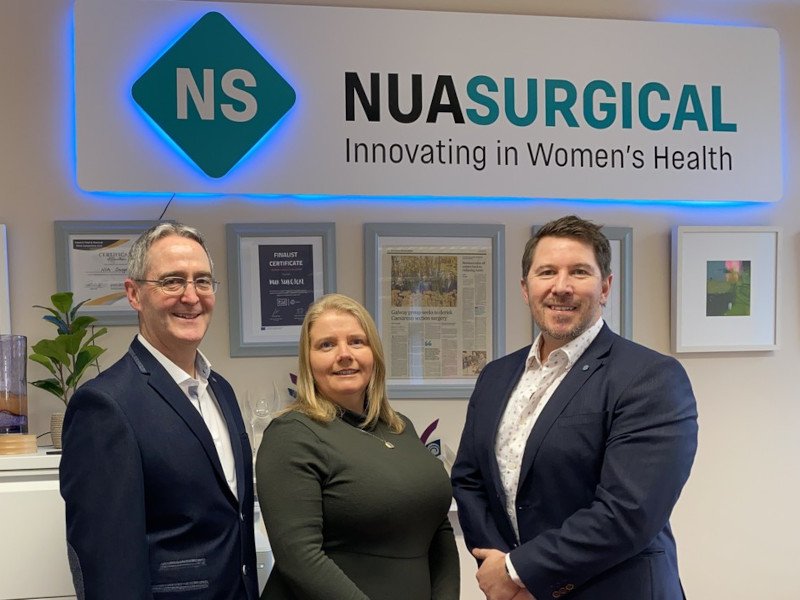
The Galway medtech, which has developed a device to improve C-section outcomes, will use the accelerator to build its presence in the US.
Nua Surgical is the only non-US start-up to be selected to participate in an accelerator aimed at addressing the issue of maternal mortality in the US.
Based at Atlantic Technological University’s Innovation Hub in Galway, Nua Surgical designs surgical devices for obstetrics and gynaecology.
Its SteriCision C-section retractor gives obstetricians hands-free, unobstructed access to the uterus during surgery, which, the company argues, reduces the risk of wound trauma and facilitates safer procedures.
The award-winning BioInnovate alumnus will now participate in 51 Labs, a women’s health accelerator that is run by Matter incubation and innovation hub, and supported by University of Chicago Medicine, BayCare, Stryker and others.
In total, 10 start-ups have been chosen to participate in the 12-week programme, which will include one-to-one mentoring with industry experts, workshops and roundtables, before culminating with a live showcase on 22 May in Chicago.
Co-founder and CEO Barry McCann described the accelerator as “another positive step” for Nua Surgical. “[It’s] a great opportunity for us to strengthen relationships with some of the top healthcare systems and women’s health companies in the US.
“For our innovative device to be recognised by subject matter experts is further validation that we truly can make a difference in maternal health outcomes which is core to our mission.”
Other start-ups to participate include Armor Medical, a woman-owned and -led medtech that has developed an early warning system for obstetric haemorrhage, BioticsAI that uses artificial intelligence to improve detection of foetal abnormalities with ultrasound, and Malama Health that has created a remote monitoring system for patients at high risk of perinatal conditions.
Last year, Nua Surgical was the only non-US company to participate in the Texas Medical Center Innovation accelerator. The six-month programme supports medtech start-ups by creating opportunities for clinical collaborations, fundraising and networking.
A crisis in US maternal care?
Maternal deaths are those that occur during pregnancy, childbirth or shortly after from conditions related to pregnancy or birth.
A 2023 study reported that US maternal deaths had more than doubled in the last 20 years, and figures from the National Vital Statistics System of the Centers for Disease Control and Prevention suggest the number could have more than tripled, leading many to decry the crisis in maternal healthcare in the States.
However, research published this month from Rutgers University and others suggests that the data for last year’s study is flawed and that US maternal mortality rates align with other wealthy nations.
According to the new research published in the American Journal of Obstetrics and Gynecology, the death rate increased when a pregnancy check box was added to death certificates leading to many deaths being attributed to pregnancy in error. The researchers suggest the death rate stands at 10 maternal deaths per 100,000 live births between 1999 and 2021, in line with international peers.
However, the study shows racial disparities in outcomes with the mortality rate for black women the highest at 23.8 deaths per 100,000 live births between 2018 and 2021.
Lead author of the study, Dr K S Joseph, a professor of obstetrics and gynaecology at the University of British Columbia, said that this research “provides evidence that can enable focused prevention initiatives targeted at high-risk and vulnerable sub-populations”.
The 51 Labs accelerator aims to tackle this mortality rate and offers participating companies investment and support to develop innovative solutions. In the call for applications, the accelerator highlighted the racial disparity in outcomes and said that preference would be given to “solutions that address the needs of underrepresented women”.
Speaking to SiliconRepublic.com in 2022, Nua Surgical co-founder and COO Marie Therese Maher said the end goal for them is to develop products that make a difference in obstetric care. “I believe every woman would want her obstetrician to have access to the best possible surgical tools.”
Find out how emerging tech trends are transforming tomorrow with our new podcast, Future Human: The Series. Listen now on Spotify, on Apple or wherever you get your podcasts.

